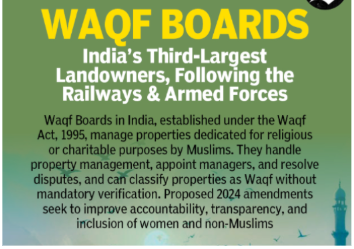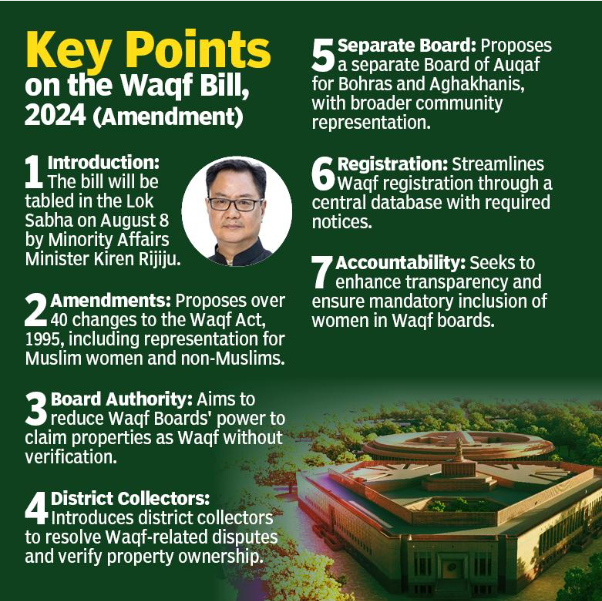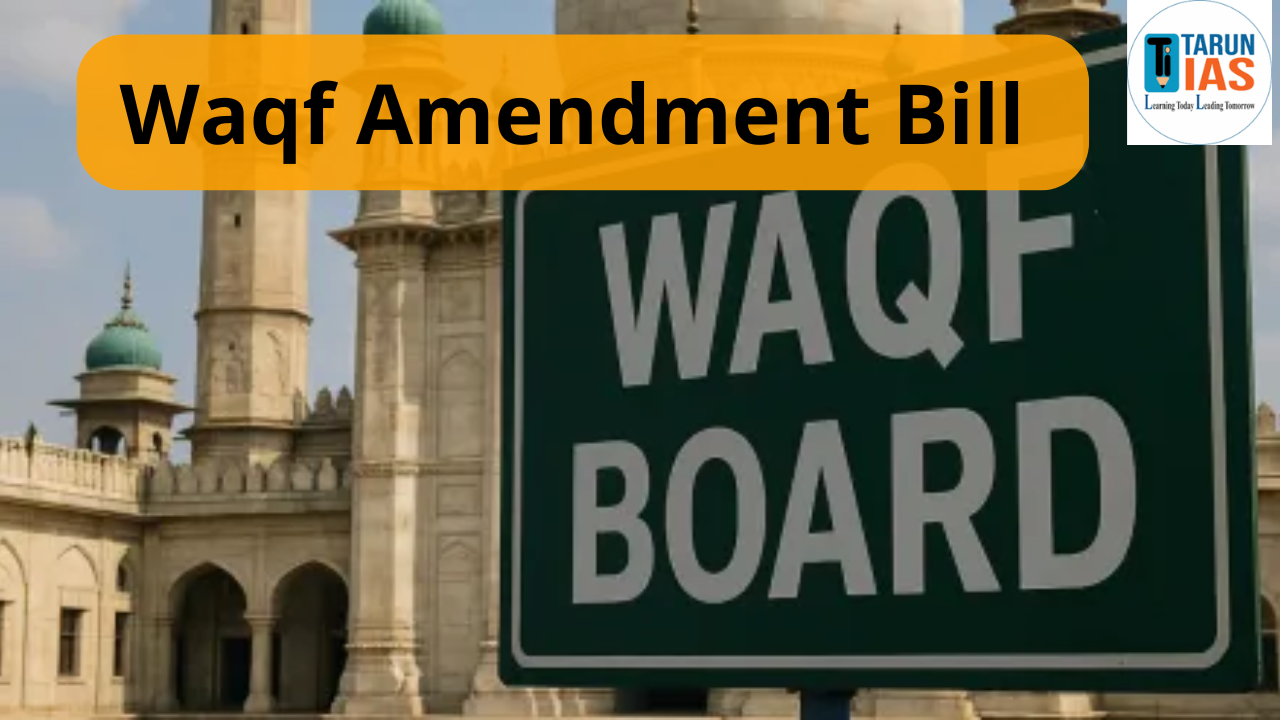Waqf (Amendment) Bill 2024 Introduction
- The Waqf (Amendment) Bill 2024, tabled in the Lok Sabha by the Union Minister of Minority Affairs, has been met with a mix of support and criticism.
- The Bill seeks to bring major reforms to the existing Waqf Act of 1995, proposing sweeping changes to the governance and regulation of Waqf properties across India.
- While the government argues that these changes are necessary to improve transparency and efficiency, opposition parties have criticized the Bill as unconstitutional, divisive, and anti-minority. In this article, we explore the concept of Waqf properties, their governance structure, and the potential implications of the Waqf (Amendment) Bill 2024.

What is a Waqf Property?
-
- A Waqf (also referred to as ḥabs or mortmain property) is an inalienable charitable endowment created under Islamic law.
- This involves a Muslim individual dedicating their property for religious, charitable, or personal purposes, with the ownership being regarded as belonging to God.
- The beneficiaries of a Waqf property can be different, but the underlying principle is that the property remains dedicated to a higher cause, whether for religious, community, or charitable services.
- Formation of Waqf:
-
- A Waqf can be created either through a written deed or an oral declaration.
- Once a property is declared as Waqf, it changes its legal character permanently, and the status cannot be reversed. A Waqf property is therefore considered a sacred endowment for public or religious benefit.
Governance Structure for Waqf Properties in India
-
- The governance of Waqf properties has evolved under various laws, with the Waqf Act 1995 currently regulating the administration and management of such properties. Historically, the governance structure for Waqf properties was first formalized during the pre-colonial period, with changes occurring through colonial and post-independence legislation.
- Pre-colonial Governance: The Muslim Waqf Validating Act of 1913 and the Mussalman Waqf Act of 1923 during colonial rule provided the first formal recognition and governance structure for Waqf properties in India.
- Post-Independence Governance: After independence, the Central Waqf Act of 1954 was introduced to provide a legal framework for Waqf property regulation. This was eventually replaced by the Waqf Act of 1995, which is currently in force.

What are Important Provisions and Institutional Structure under the Waqf Act?
-
- The Waqf Act of 1995 provides a structured framework for the administration and regulation of Waqf properties across India. Below are the key features of this legislation:
- Survey Commissioner: The Waqf Act appoints a Survey Commissioner to maintain a list of all Waqf properties in the country. The commissioner is responsible for local investigations, summoning witnesses, and collecting public documents to ensure accurate record-keeping of Waqf properties.
- Mutawalli (Caretaker): A Mutawalli is a caretaker or manager of the Waqf property, responsible for overseeing the property’s administration. The Mutawalli ensures that the property is used for the intended religious or charitable purposes and manages its daily operations.
- Management of Waqf Properties: Waqf properties are managed similarly to trusts under the Indian Trusts Act of 1882. The properties are meant to be used for public benefit, and their management follows a strict set of rules to ensure transparency, accountability, and proper utilization.
The Waqf Boards
- About Waqf Boards: A Waqf Board is a state-level body that acts as the custodian of Waqf properties within the state. In some states, there are separate Waqf Boards for the Shia and Sunni communities. These boards manage significant religious properties, including mosques, madrasas, and other charitable institutions.
- Composition of Waqf Boards:
-
- Chairperson: The board is typically headed by a chairperson, often a prominent figure in the community. Members: The board includes:
- Nominees from the state government
- Muslim legislators and parliamentarians
- Members of the state Bar Council
- Scholars of Islamic theology
- Mutawallis of large Waqfs (properties with an annual income of ₹1 lakh and above)
- Powers and Functions:
- Administration: Waqf Boards manage the properties, ensuring proper utilization for religious and charitable purposes.
- Sanctioning Transactions: Any transfer of Waqf property (e.g., sale, lease, mortgage) requires approval from the board. A two-thirds majority is necessary for such transactions to proceed.
- Central Waqf Council (CWC): The Central Waqf Council (CWC) was established in 1964 to provide guidance and oversight for state-level Waqf boards across India.
- Functions:
- Advisory Role: The CWC guides both the Central and state governments on property management and advises Waqf boards on best practices.
- Monitoring: It ensures that Waqf boards provide regular updates on their financial records and overall performance.
- Waqf Tribunal: The Waqf Tribunal, created by the Waqf Act 1995, handles disputes concerning Waqf properties. The Tribunal’s decision is considered final in disputes related to the status of a property as Waqf.
- Composition:
- Chairperson: A District Judge or judicial officer.
- Member: A state civil services officer.
- Expert: A person well-versed in Islamic law and jurisprudence.
- 2013 Amendment to Waqf Act: The 2013 amendment to the Waqf Act 1995 introduced several significant changes:
- Authority to Waqf Boards to designate properties as Waqf.
- Penalizing encroachment on Waqf properties, with up to two years imprisonment.
- Explicitly prohibiting the sale, gift, mortgage, or transfer of Waqf properties.
What are Key Changes Introduced by the Waqf Amendment Bill 2024?
- Waqf Formation:
-
- Methods of Establishing Waqfs: The Bill provides three ways to establish a Waqf:
- Declaration: A formal declaration establishing the property as Waqf.
- Recognition of Long-Term Use: A property that has been used for religious or charitable purposes for an extended period can be recognized as Waqf.
- Endowment After Succession: Waqfs can be formed as an endowment after the completion of the succession process.
-
- Eligibility for Declaring Waqfs: Only practicing Muslims who have owned property for at least five years can establish a Waqf, ensuring that only those with a proven history of property ownership can engage in the Waqf formation.
- Property and Ownership Changes:
-
-
- Government Property: Any government property identified as Waqf will be transferred to state ownership. Disputed cases related to this will be resolved by the District Collector.
- Waqf Property Determination: The Bill removes the Waqf Board’s authority to determine Waqf properties, transferring the responsibility to the state revenue department for greater clarity and administrative control.
- Waqf Surveys: Waqf surveys will now be conducted by Collectors in accordance with state revenue laws instead of the previous system under Waqf Boards.
-
- Changes in Governance and Representation:
-
- Central Waqf Council:
- The Central Waqf Council (CWC) will now include two non-Muslim members. This aims to bring a diverse representation to the governance of Waqf properties.
- Inclusivity: The Bill allows for non-Muslim MPs, judges, and eminent persons to be part of the Council. However, at least two Muslim women must be members to ensure gender representation.
- Waqf Boards: State governments will appoint members to the Waqf Boards, including:
- Two non-Muslims
- Representatives from Shia, Sunni, and backward Muslim communities
- Women representation remains mandatory.
- Tribunal and Legal Changes:
-
- Tribunal Composition:
- Experts in Muslim law will be removed from the Waqf Tribunal. The Tribunal will now consist of:
- A District Court judge
- A state officer of joint secretary rank
- Appeals: Decisions made by the Waqf Tribunal can now be appealed in the High Court within 90 days, providing a more balanced approach to addressing grievances.
- Central Government Oversight:
-
-
- Regulation: The central government will have a larger role in regulating the registration, waqf accounts, and the activities of Waqf Boards to ensure national-level oversight.
- Audit: The Comptroller and Auditor General (CAG) will conduct audits of Waqf property management, improving financial accountability and transparency.
-
- Separate Waqf Boards for Specific Sects:
-
- The Bill allows for the creation of separate Waqf Boards for sects such as the Bohra and Agakhani communities. This ensures that each sect has tailored governance to manage its Waqf properties.
Rationale for the Key Changes in the Waqf Amendment Bill 2024
- Streamlining Legal Disputes and Jurisdiction Issues: Previously, the Waqf Tribunal’s decisions could not be appealed in civil courts, leading to perceptions of bias. The Bill now allows for appeals in the High Court, improving fairness and legal transparency.
- Promoting Women’s Representation and Empowerment: The Bill emphasizes gender inclusion by requiring women’s representation in both the Central Waqf Council and state-level Waqf Boards. This move is seen as an important step toward empowering women in religious governance and ensuring equal participation.
- Addressing Mismanagement and Corruption in Waqf Boards: Historically, Waqf Boards have faced criticism for their lack of transparency in financial operations and the mismanagement of properties. The Bill seeks to address these concerns by:
-
-
- Introducing more centralized oversight by the CAG for auditing financial records.
- Expanding representation in governance bodies to ensure better diversity and accountability.
-
- Reducing Property Disputes: Disputes over Waqf properties have been a longstanding issue in India. The Bill aims to streamline property determinations by:
-
- Clarifying property claims through more structured processes managed by state revenue departments and district collectors.
- Introducing mandatory property verification to reduce discrepancies and fraud.
Key Concerns Surrounding the Waqf (Amendment) Bill 2024
- Violation of Religious Rights: One of the most prominent concerns raised by critics is that the Waqf Amendment Bill violates the religious freedoms guaranteed under Article 25 of the Indian Constitution, which protects the freedom of religion. By allowing greater government involvement and the inclusion of non-Muslim members in the Waqf Boards, critics argue that the bill undermines the autonomy of the Muslim community in managing their own religious properties. Waqfs are traditionally governed by Islamic law, and critics fear that these changes could dilute the religious integrity of Waqf property management.
- Increased Government Control: The amendments provide for greater government oversight of Waqf properties, including district collectors resolving property disputes and central government regulation of Waqf operations. There are concerns that this could lead to bureaucratic delays and a centralized control over what has traditionally been a community-managed system. Critics argue that such centralization could lead to judicial-executive overreach, making the Waqf governance system less responsive and more vulnerable to political influence.
- Inclusion of Non-Muslims in Waqf Boards: The Waqf Amendment Bill proposes the inclusion of non-Muslim members in both the Central Waqf Council and State Waqf Boards. While this aims to bring in greater diversity and representation, opponents argue that non-Muslim members may lack the necessary understanding of Islamic practices and the religious significance of Waqf properties. This could undermine the religious autonomy of Muslim communities in managing their endowments.
- Potential for Increased Disputes: The Bill proposes removing the Waqf Tribunal’s authority, transferring responsibility for property disputes to district collectors. Critics argue that this change could increase legal complexities and disputes over Waqf properties. District collectors may not have the specialized expertise required to handle Muslim law and Waqf-specific issues, which could complicate the dispute resolution process and lead to delays in justice.
- Lack of Community Consultation: The Bill has been criticized for being drafted without adequate consultation with Muslim community leaders, Islamic scholars, and civil society organizations. Many believe that such top-down reforms could be disconnected from the actual needs and concerns of those most affected. Muslim organizations, including the All India Muslim Personal Law Board, have expressed concerns that the Bill was introduced without proper community input, which could lead to alienation and resistance.
What Should be the Way Forward?
- Protection of Waqf Properties: To address concerns about the mismanagement and disputes related to Waqf properties, it is essential to establish a clear and transparent process for determining the status of Waqf properties. The involvement of judicial oversight in property claims can ensure fairness and accountability in the decision-making process, protecting Waqf assets from arbitrary decisions.
- Broader Consultation: The government should engage in extensive consultations with stakeholders, including Muslim community leaders, religious scholars, legal experts, and civil society organizations. Such consultations will help ensure that the Waqf Amendment Bill reflects the concerns and needs of all parties involved, particularly the communities directly impacted by the changes. This participatory approach will ensure that reforms are implemented in a way that is inclusive and representative.
- Public Awareness Campaigns: A public awareness campaign should be launched to inform Muslim communities about the Waqf system and the proposed changes. This campaign should aim to dispel misconceptions, clarify the rights and responsibilities of Waqf stakeholders, and promote understanding of the amendments. By fostering community engagement and education, the government can address concerns and promote a sense of inclusivity in the reform process.
- Strengthening the Waqf Tribunal: Instead of removing the Waqf Tribunal’s authority, the government should work towards strengthening and modernizing the Tribunal. Ensuring that legal experts in Muslim law remain part of the tribunal would preserve its specialized nature while addressing concerns about legal bias. Additionally, the tribunal’s decisions should be appealable to higher courts to ensure fairness and justice.















